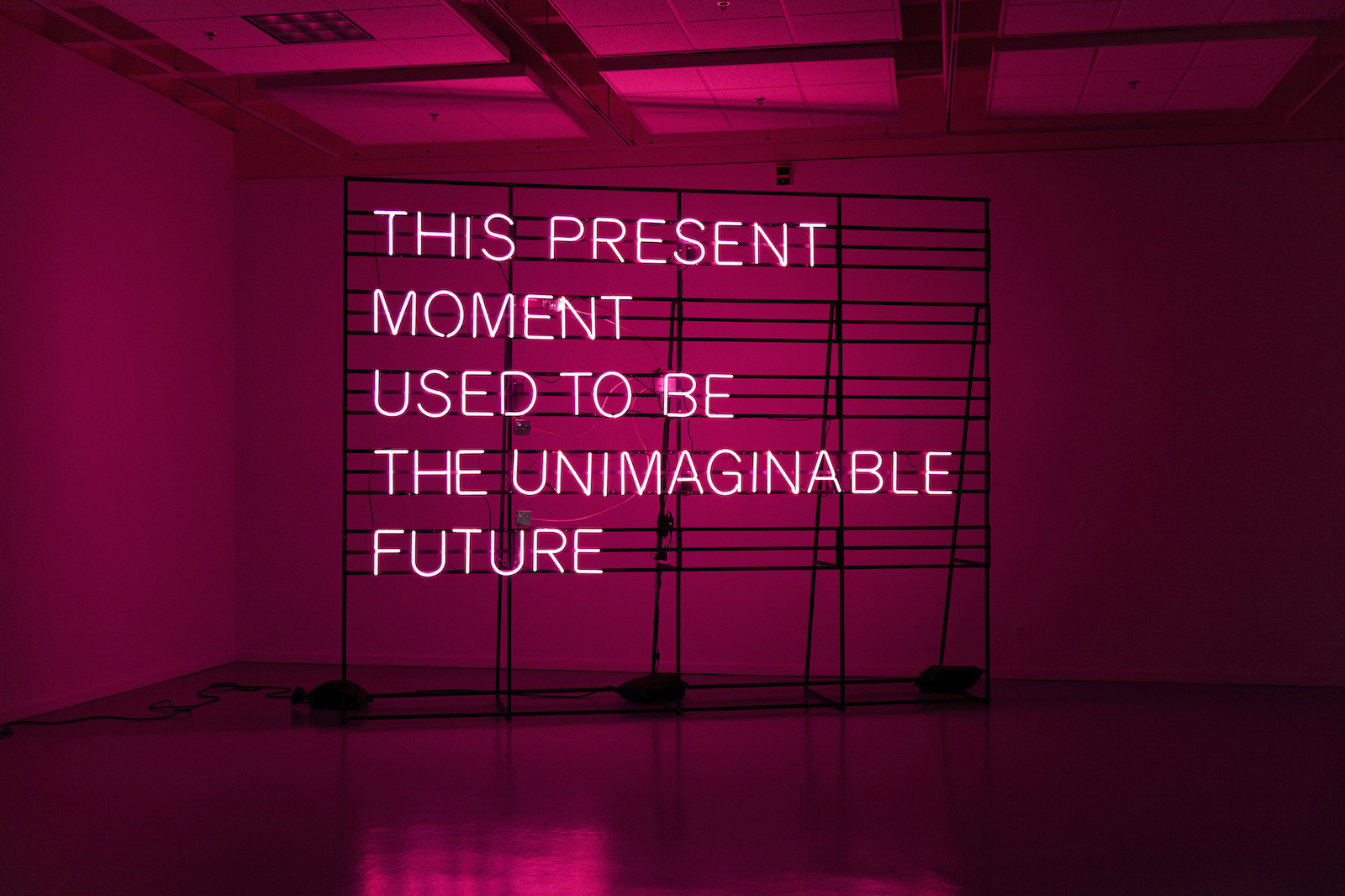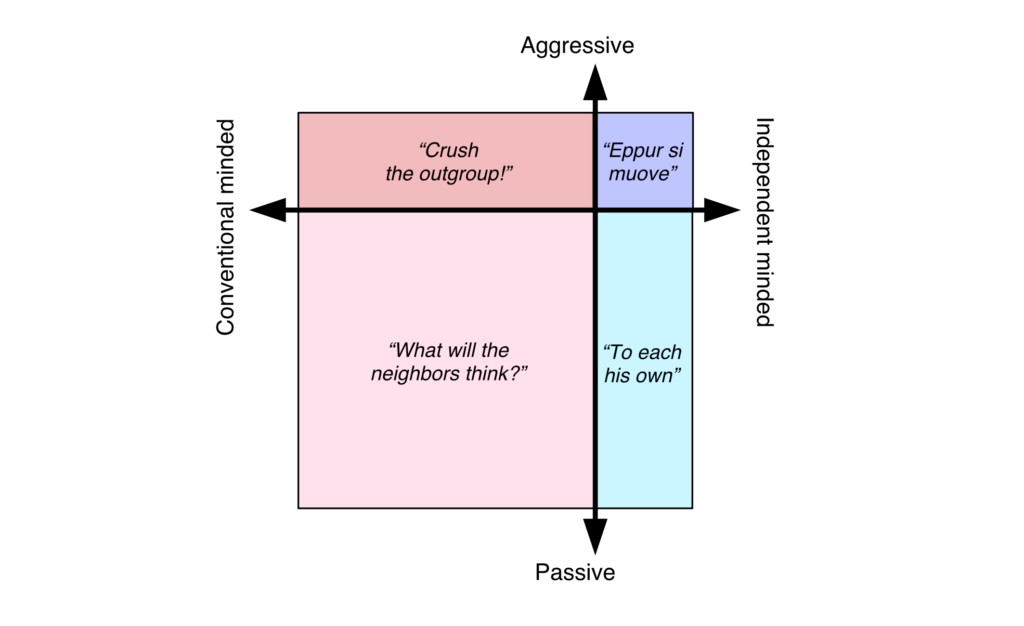Status Quo

Disclaimer
This picture is a commentary on human sacrifice as a societal practice, nothing else.
“Whenever serious and competent people need to get things done in the real world, all considerations of tradition and protocol fly out the window.” ~ Neal Stephenson
The status quo is taken seriously for many reasons, because most people are conservative in a way that few ever state or articulate completely– This convention, institution, etc. is the right way because it is the way I know best. To find a better way of doing things is often unimaginable on sometimes the smallest scale. “Why would someone put the toilet paper roll that way?”
We can imagine a narrow band of possible ideas around the world with narrow starting points of values systems. Ironically, the world is full of differing ideologies, goals, and strategies to fulfill the plurality of end states people are looking to reach.
Some systems emerge from starting conditions of the game of life or subgames like competitive markets. These systems cannot be predicted from the starting state. Many more are arbitrarily chosen and simply convention because that is how things are. Most systems were created by people no smarter than us in the context of their particular ends. Without committing the Chesterton’s Fence fallacy, where an old system is torn down without knowing why it is there, we can carefully ask ourselves whether a system exists because it is the best possible one or it is merely the only one we can currently imagine ? Have we read about legal systems very different from our own? Have we considered what the constraints are on the problem?
The truth is that “unless something violates the laws of physics, it is possible.” ~ Chiara Marletto, Physicist
Value Constellations and Not Seeing The Gorilla
People are unable to perceive things they do not value or deem as important. For example, if someone says “but it does the same thing” with reference to a junker/jalopy when the other person is primarily concerned with how the car looks then the value appeal will fall flat. In the case of the car the argument could last a while because the people are arguing from different vantage points and not simply raising their values are different. Arguing about values is hard because you need to persuade someone or vice versa, that your constellation is “better to view” which may be a preference only.
Another example is the frequent argument that humans are a “unique species” while ignoring that all the dimensions in which we are “unique and stand out” are dimensions we picked for ourselves. If a bee picked the criteria for what makes all creatures unique, do you not think it would put making sweet energy packed liquids high on their list?
There are more value systems than most people see but when looking up at the sky, most people only see the big dipper or Orion’s belt–once you see one constellation, it is hard to see the same stars in another formation but these constellations are simply imposed upon the world and do not exist in the patterns we see them as. Engineers value building, scientists value discovery and free inquiry. So the argument that someone’s values and beliefs are the penultimate right ones is harder to justify just as it is hard to say “Orion’s belt is the only way to view those stars.”
What does this all have to do with a gorilla? Well there is an experiment in which people were told to focus on a ball being dribbled back and forth between people on the court. Most people were so focused on the ball that they did not notice that someone in a gorilla suit walked onto the court and beat their chest. People that do notice the gorilla perceive more of reality consciously. Similarly, people that realize that their value system or view of reality is one of many have an advantage. They can change between value systems for strategic advantage. They can both keep their eye on the ball and not lose focus on the bigger picture Persons with this ability are sometimes called shapers in Ray Dalio personality inventory parliance.
Types of Skepticism
Analytic types: Top Down, Bottom Up Emotional: Disgusted, Cautious
Top down skepticism is an initial reaction to a claim lacking evidence of pre-processing, often called a sniff test. In a software context it is called checksums when a programer has not falsified the statement believed to be falset. Some claims are easily dismissed from this perspective. Claiming “the earth is flat” can be dismissed simply because we know how to measure or calculate this without some deep bottom up process. Additionally, the old adage “that can be presented without evidence can be dismissed without evidence” holds. However, most people use top down skepticism without ever putting in the work evaluating their base assumptions.
Bottom up skepticism is putting in the work from first principles to come to a conclusion and does not rely on quick thinking to draw conclusions. This is a formal refutation of the claim that requires serious pre-processing work. Bottom up skepticism is rare to see because it requires more than the initial “disgust factor” that causes an idea to be dismissed. In fact, most skepticism is, from an emotional perspective, a form of disgust and not rational. That’s why skepticism gets a bad wrap because many skeptics are simply disgusted and negative, not methodological and freely interested in digging for the truth.
Are you avoiding cognitive biases and mostly not committing logical fallacies? This is a broad category bucketed as irrationality, but cognitive biases are simply committing from this broad list https://en.wikipedia.org/wiki/List_of_cognitive_biases note that status quo bias is actually one of the many forms of biases we have.
How to Disagree
Without getting into the myriad of logical fallacies, the fallacy fallacy, and cognitive biases, let’s consider the simple question “is the [insert status quoa social convention, deep human truth, or is it an objective truth like gravity”?
Without falling prey to emotionally naive skepticism, let’s consider this more deeply given the facts: not thinking something is possible is top down skepticism based on a gut reaction. A more mature, thoughtful form of skepticism involves rational discourse and scientific methodology. We climb the hierarchy of disagreement to refute the central point, identify the main point(s) of someone’s argument and show it to be false. In addition, you must reinforce their argument by building the best form of the other side’s argument and then try to wrestle directly with that- called Steel manning the argument. One must pass the ideological Turing Test by stating an opposing view as clearly and persuasively as you can state your side, making you pass the ideological Turing Test to someone who holds that position.
Another way to look at this is that the arguments for the status quo are made by the group Tyler Cowen calls “Base-raters.”
“Political scientist Philip Tetlock, in his work on superforecasters, has shown that base-rate thinking is often more reliable than the supposed wisdom of experts. Most of the world, most of the time, does not change very quickly. So there is an advantage to considering broadly common historical probabilities and simply refusing to impose too much structure on a problem.
That said, there are some cases where base-rate thinking goes askew. Base-rate thinking obscured the ability to foresee the highly unusual 2008 financial crisis, for example. If applied in, say, 2014, base-rate thinking would not have predicted the election of Donald Trump.” Base-raters are only right when looking at a more average view of the world and cannot predict unusual events. Many people called the Coronavirus pandemic a “Black Swan” referring to an unknown unknown, vs a known unknown, event in Nassem Taleb’s famous book Black Swan. The pandemic was predictable given mathematical simulations of a novel virus with the potential for spread occurring and our lack of preparation for it. It was only shocking because people either were naive skeptics or a more sophisticated base-rater. A Scientifically literate person would be able to see a pandemic was possible after evaluating the evidence from mathematical models of what would happen at the introduction of a virus with the potential for spread in an epicenter of international travel. In short, the reason many people believe things is by convention, infrequency of a certain event occurring with gut feeling it is the “right way” since it is the convention they are accustomed to.
What does this have to do with the status quo? Well most people do the opposite: they are knee jerk skeptics while not realizing the burden of proof is on them to provide evidence that the “status quo” is not arbitrary, not the person questioning the current system, providing a caricatured version of the original position without understand the central point, and being completely unable to state the reasons the other side found it persuasive in a way any person holding that position would accept.
Thus, let me state another historical point: the status quo changes all the time. The status quo doesn’t even change a little bit, it changes a lot and frequently but not on a 3-5 year time scale, over decades. For instance, “we have always had an education system like this.” when we haven’t even had the same pedagogy models for more than a couple hundred years and we know exactly who invented the ideas. So if the status quo changes all the time, how exactly can someone view the current answer as the right way?
This comes down to a more important social question than epistemological question: what types of people exist in the world on the conformist and nonconformist quadrants?
“listening to the herd invites regression to the mean”

The status quo exists merely because of populations on any given issue. So most people will be conformists on most things, but the critical idea here is that hand waving and saying “there is a better way” is not compelling to anyone. One needs to create a better way either a minimal viable test or framework. Some way to get some people to believe it is possible and if it is better, a lot better, or a paradigm shift, then people will come and watch. Perhaps a status quo exists simply because of convention but one must also ask “to whose benefit?” For instance, not allowing certain groups to vote benefitted a particular group of people and their core argument could not be held around once others were empowered.
“To reject one paradigm without simultaneously substituting another is to reject science itself.” ~ Thomas S. Kuhn, The Structure of Scientific Revolutions
The status quo supports those currently in power instead of the more reasonable assumption that “this is just one of many systems” vs “our system, by default, is the best one and that is the embedded assumption thus the burden of proof is on you to disprove us.”
The deeper irony is that those who thoughtfully test the status quo aren’t just right, they are right by default by simply saying " we can do better. " Unless, of course, we are living in the best of all possible worlds from what we currently have. Is that the case? Probably not, so the intellectual arrogance falls once again on the status quo since the status quo claims the best system is the current one. Any argument toward the status quo is simply an argument to not think or complacency unless you can prove we have found the paradise we seek. In contrast, anyone selling you paradise is likely selling you something too–most likely another lie.
Another issue is Preference Falsification, those who claim to be part of the consensus or status quo are in fact simply doing it not to challenge what is. Preference Falsification isn’t just stating a false viewpoint, it is living a lie. The conformity militia is strong, stronger still is the need to be accepted than the need for truth in many cases. Think deeply through your beliefs and values, do they align easily with where you live, who you affiliate with? Do you hold any views you would be afraid to publicly state in a large group of your peers? If not, you are simply a conformist and your mind just finds the median, mean, or mode of what the common cluster of beliefs are and go with that. More likely, you are afraid to say something because it could be considered heresy and you could lose your place in our society. Pick your battles, but don’t pick never to fight for anything or you don’t have morals; instead you have strategic values only similar to someone who is unscrupulous and just states whatever is the vogue or what the group wants to hear.
Here are some questions which go again the status quo, but you likely can say:
-
Does peer review reduce the amount of replication crisis in fields? Does it improve innovation and results?
-
Have computers made knowledge workers more or less productive in some areas? In all areas?
-
Randomized Controlled Trials (RCT) are useful in science, why don’t we use them to test other systems to innovate further outside of science?
-
Is all knowledge good?
-
What big idea does the opposite group get right that your group gets wrong? If you cannot think of anything, how likely is that to be true given the vast expanse of knowledge in each group’s camp?
“Treat it as a puzzle. You know that some accepted ideas will later turn out to be wrong. See if you can guess which. The end goal is not to find flaws in the things you’re told, but to find the new ideas that had been concealed by the broken ones. So this game should be an exciting quest for novelty, not a boring protocol for intellectual hygiene” ~ Paul Graham
If you want to find a better way, make one and try to get people to test it out. The status quo is less compelling than a fully articulated vision of a better future. That future should be well thought out and evidence based. It may be much worse, plenty of people paved a way to a paradise that turned into hell on earth. Plenty of the people turned out simply to be useful idiots following another status quo, the fashions of the times.
One of the more superficial questions of the status quo is “the leader is rotten” which ignores the process that puts these leaders into their positions– let’s call this the leadership supply chain. Such a superficial questioning leads to things like the dictator wheel. The issue on the leadership supply chain is upstream to the current instance of the leader and how they came into power.

What truths are we ignoring that would further knowledge as much as knowing geocentrism is incorrect? It is highly improbable there are none, are any laid in taboos or force around the corner for questioning them? If something is untrue and morally wrong it will likely be opaque and the defense for it is likely to be quite dirty: lawsuits, threats of force, etc.
How to disagree with the status quo and get rewarded? The best answer I have found is prediction markets and securities markets because being right pays and there is a way to test your claims in markets with clearer outcomes. Don’t argue, build and criticize by creating or putting skin in the game with investment in company, ideas, or people you can back to change the status quo for the better.
Additional Links
https://guzey.com/ideas-not-mattering-is-a-psyop/
http://paulgraham.com/conformism.html
https://medium.com/future-literacy/zeroth-principles-thinking-9376d0b7e7f5
http://www.paulgraham.com/say.html
http://paulgraham.com/think.html
https://en.wikipedia.org/wiki/Preference_falsification
https://en.wikipedia.org/wiki/William_Wilberforce
Flatland: A Romance of Many Dimensions by Edwin Abbott
“Yet mark his perfect self-contentment, and hence learn this lesson, that to be self-contented is to be vile and ignorant, and that to aspire is better than to be blindly and impotently happy.” ― Edwin A. Abbott, Flatland: A Romance of Many Dimensions